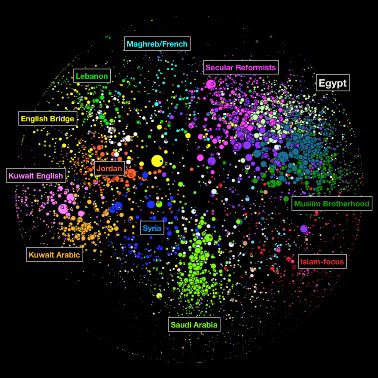New Media and Blogs in the Middle East
September 3rd, 2009 — Bruce EtlingFor those that haven’t made it through our 70 page paper on the Arabic blogosphere, we’ve got a digestible two page version in the latest Middle East Institute Bulletin, which is focused this quarter on new media in the Middle East, an issue near and dear to our hearts. Here is one of the many interesting findings:
Blogs are an integral part of the Arabic media ecosystem. We found that bloggers link to Web 2.0 sites such as YouTube and Wikipedia (both the English and Arabic versions) more than other sources of information and news available on the Internet. Al Jazeera is the top mainstream media source, followed by the BBC and Al Arabiya, while US government-funded media outlets like Radio Sawa and Al Hurra are linked to relatively infrequently. Most national media outlets do not have much reach outside of their respective national clusters.
Returning to YouTube, we found that Arabic bloggers tend to prefer politically oriented videos to cultural ones. Videos related to the conflict in Gaza and the throwing of shoes at George W. Bush in Iraq are popular across the entire blogosphere, while clips related to domestic political issues are linked to more heavily by the various national clusters, such as Kuwaiti parliamentary campaign videos.
And I continue to be struck by what we did not find:
While much has been made of Iraqi bloggers during ongoing debates about the Iraq war, this group does not figure prominently in the Arabic blogosphere. Rather, they are deeply integrated into the English Bridge group. This may be because many Iraqi bloggers write in English and have many inbound links from US think tanks, journalists, and partisan political bloggers (“Iraq the Model” on the right, “Riverbend” on the left, for example), rather than mainly writing for a domestic public. We also did not find any cluster of bloggers dedicated to violent extremism.
Check it out (here).



 Click Here
Click Here